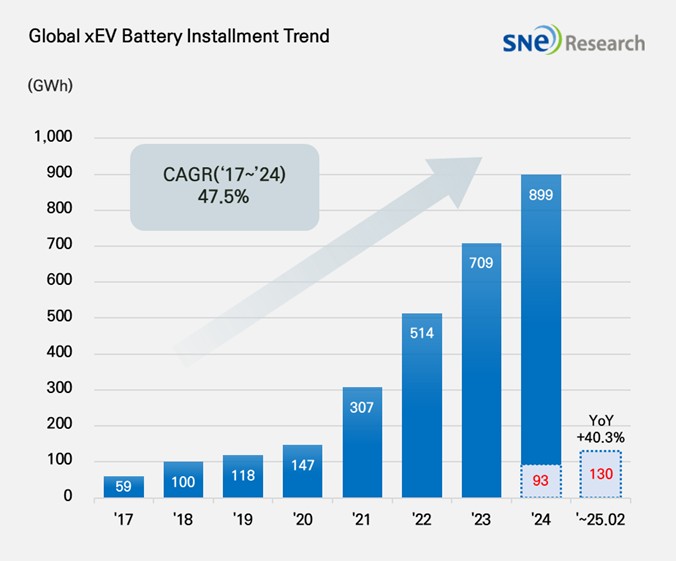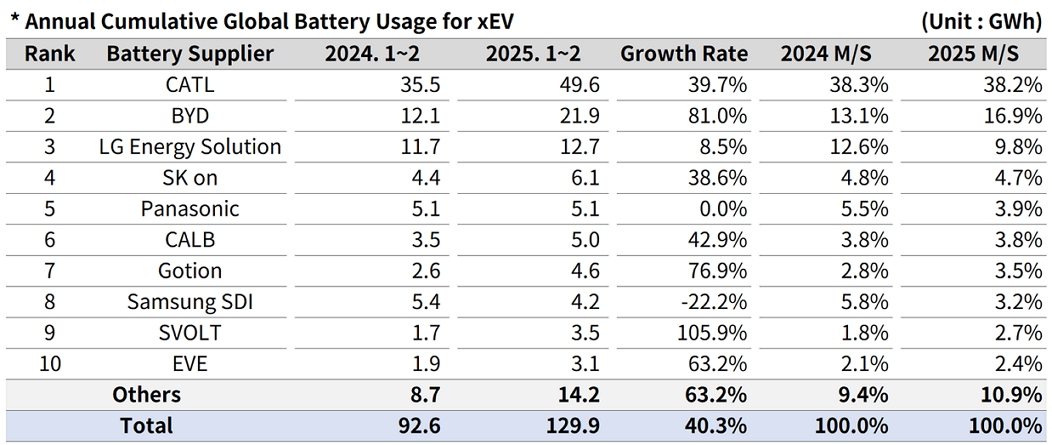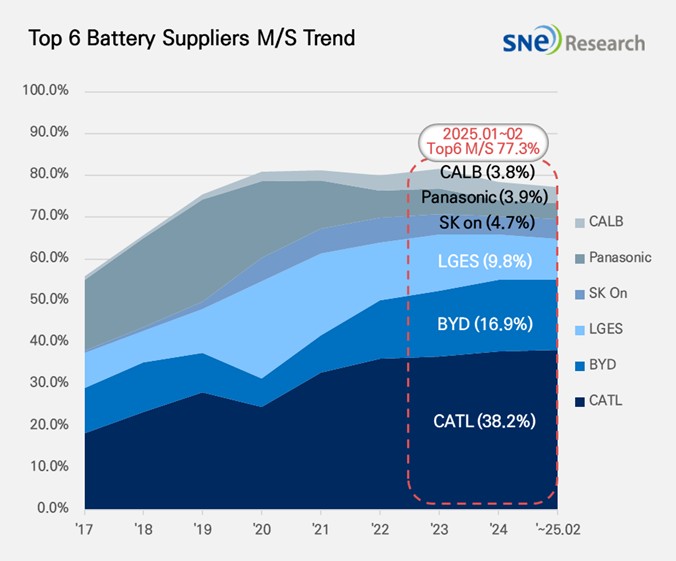From Jan to Feb 2025, Global[1] EV Battery Usage[2] Posted 129.9GWh, a 40.3% YoY Growth
- From Jan to Feb 2025, K-trio’s M/S recorded 17.7%
From Jan to
Feb 2025, the amount of energy held by batteries for electric vehicles (EV,
PHEV, HEV) registered worldwide was approximately 129.9GWh, a 40.3% YoY growth.

(Source: 2025 Mar Global Monthly EV and Battery Monthly Tracker, SNE Research)
The combined market shares of LG Energy Solution, SK On, and Samsung SDI in global electric vehicle battery usage from Jan to Feb 2025 posted 17.7%, a 5.5%p decline from the same period of last year. LG Energy Solution remained 3rd on the list with 8.5%(12.7GWh) YoY growth. SK On ranked 4th with a 38.6%(6.1GWh) growth. On the other hand, Samsung SDI exhibited a 22.2%(4.2GWh) degrowth. The downward trend in Samsung SDI’s battery usage was mainly caused by a decline in demand for batteries from major car OEMs in Europe and North America.

(Source: 2025 Mar Global Monthly EV and Battery Monthly Tracker, SNE Research)
If we look at the usage of battery made by the K-trio in terms of the sales volume of models, Samsung SDI’s battery was mainly used in BMW, followed by Audi and Rivian. BMW has Samsung SDI’s battery in its models such as i4, i5, i7, and iX, and among these, i5 released in 2023 sold well in the market. On the other hand, even though Rivian posted a steady sales of R1S and R1T in the US, the release of standard-range trim with LFP battery, made by a battery maker other than Samsung SDI, had a negative impact on the installment volume of battery made by Samsung SDI. AUDI saw a decrease in sales of Q8 e-Tron, leading to a 21.9% decline in the usage of Samsung SDI’s battery in BMW, VW, and Rivian groups.
SK On’s battery was mainly installed in EV models made by Hyundai Motor Group, followed by Mercedes-Benz and Volkswagen. Hyundai Motor Group saw a recovery in sales after the facelifted version of IONIQ 5 and EV 6 were released. Mercedes-Benz saw favorable sales of compact SUV EQA and EQB, to which SK On’s battery are installed, which was similar to the same period of last year. Along with this, solid sales of VW ID.7 and ID.4 also brought about a positive impact on growth of battery usage made by SK On.
LG Energy Solution’s battery was mainly used by Tesla, followed by VW, Chevrolet, and Kia. In case of Tesla, the sales decline of models equipped with LG Energy Solution’s batteries led to a 35.7% decrease in Tesla’s usage of LG Energy Solution’s batteries. Meanwhile, the total usage grew by 8.5% due to favorable sales of VW’s ID series and Kia’s EV3, and the expanded sales of Chevrolet Equinox, Blazer, and Silverado EVs, which are built on the Ultium platform.
Panasonic, which supplies batteries to Tesla, remained 5th on the list with a battery usage of 5.1GWh. As Panasonic’s battery usage is highly dependent on the sales of Tesla, the decline in sales of Model 3 and Y is analyzed as the main reason for decreasing sales of Tesla this year. Panasonic is expected to quickly recover its battery usage in North America, primarily for Tesla, by releasing improved 2170 and 4680 cells.
China’s CATL maintained its position at the global leading battery company, growing by 39.7%(49.6GWh) compared to the same period of last year. In addition to key OEMs like ZEEKR, AITO, Li Auto, and Xiaomi adopting CATL’s batteries, many global major OEMs, including Tesla, BMW, Mercedes-Benz, and Volkswagen, are also using CATL’s batteries.
BYD ranked 2nd on the list with a growth rate of 81.0%(21.9GWh). BYD, which manufactures both batteries and electric vehicles (BEV+PHEV) in-house, is gaining significant popularity by introducing a variety of electric vehicles to the market, leveraging its strong price competitiveness. In 2024, BYD’s electric vehicle sales reached approximately 4 million units, and the company plans to maintain its growth momentum with a target of around 6 million new vehicle sales in 2025. In particular, BYD has been expanding beyond the Chinese domestic market and entering markets in Asia, including South Korea, and Europe, rapidly capturing market shares.

(Source: 2025 Mar Global Monthly EV and Battery Monthly Tracker, SNE Research)
In the global electric market, uncertainties have been increasing as the Trump Administration declared that it would increase tariffs. To be specific, with the US government declaring to increase tariffs on batteries and major raw materials from China, tensions are rising across the entire supply chain of electric vehicles. Against this backdrop, the global companies, who have been dependent on raw materials and batteries from China, have been working on restructuring their supply chains. It has become also important for K-trio to come up with strategic measures to increase their local production in North America and diversify raw material suppliers.
[2] Based on battery installation for xEV registered during the relevant period.

